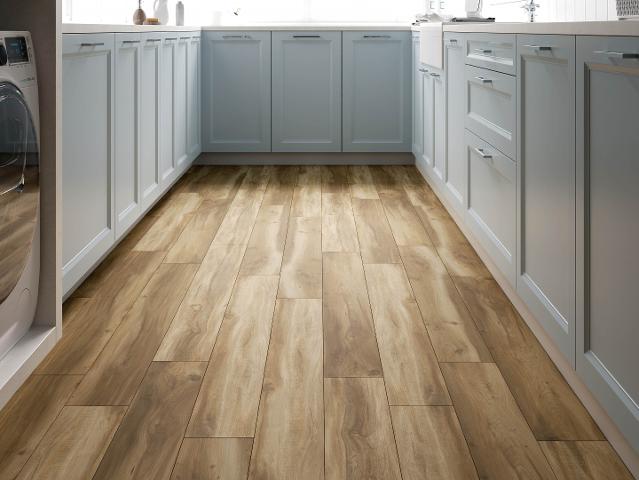
In the bustling environment of a restaurant or commercial kitchen, selecting the right flooring material is about more than aesthetics. Flooring directly impacts safety, functionality, and cleanliness. When choosing restaurant flooring, there’s much to consider, including how the material will withstand constant foot traffic, equipment, and daily activities, such as food preparation and facility maintenance. Before choosing a floor for your restaurant, cafe, or food service business, you must consider safety, hygiene, durability, maintenance, and how the flooring supports operational efficiency. This article will explore what you need to consider when choosing the best flooring for a commercial kitchen. We’ll also review the pros and cons of various flooring materials for restaurant kitchens.
What considerations are needed for restaurant kitchen flooring?
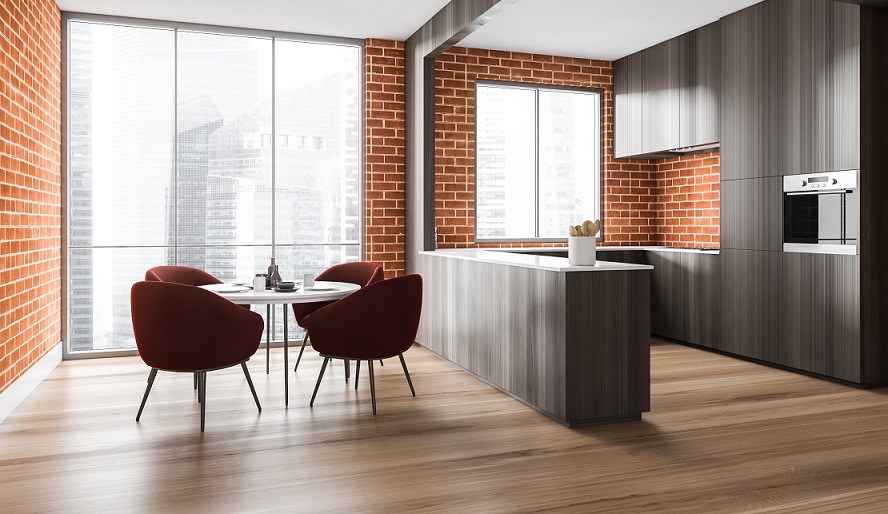
Before diving into the diverse range of flooring options available, it’s important to consider each kitchen’s specific needs, your budget, and the long-term impact of the chosen material on safety, hygiene, and functionality.
Easy Installation & Repair
Time is money in any business and particularly in restaurants, so long installation times can directly affect the bottom line during renovations and remodels. Some restaurant flooring materials require time to set and cure, which can delay projects or even the opening of a new restaurant. One of the primary considerations for any commercial kitchen flooring is its ease of installation. Restaurants and retail food service businesses have tight margins, so flooring materials with long lead times and lengthy installation processes are less than ideal. Whether it’s a new restaurant or an established business, it’s best to minimize installation and repair times wherever possible.
Hygienic
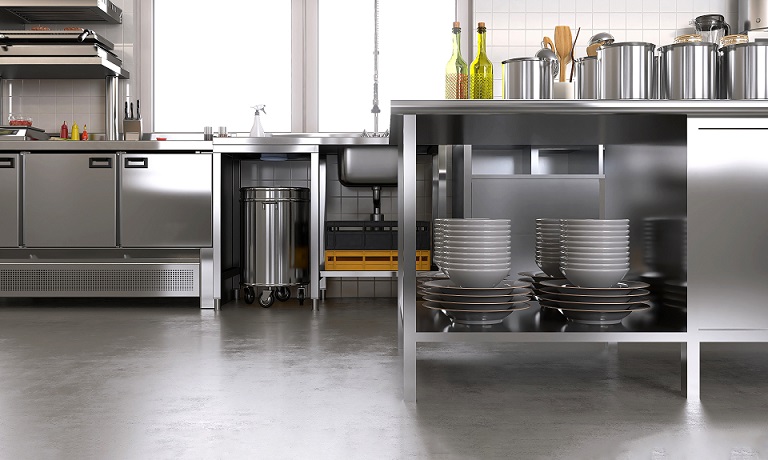
Restaurant flooring must meet stringent hygiene standards. Hygiene directly affects the reputation of the restaurant, including health inspection grades. It also impacts worker and patron safety. Some flooring materials are better at contamination prevention from spills and food material, which can prevent bacteria and microorganisms from growing and spreading. In a busy kitchen or dining area, cleaning should be straightforward and effective. The ideal flooring should resist staining and be able to be cleaned with regular cleaning agents that will not degrade the product. To ensure proper hygiene standards are followed in a commercial kitchen, look for nonporous flooring that’s easy to clean, has few seams, and includes antimicrobial properties.
Slip Resistance
Slip resistance is a primary consideration for restaurant flooring. And a flooring that is highly slip resistant offers several benefits. Slip resistant flooring can prevent drink or food spills from staff, which are frequent occurrences in busy kitchens. Slips and falls by employees and workers are among the most common workplace accidents, and they can lead to injuries ranging from minor sprains to more severe conditions like fractures or even head injuries. A slip-resistant floor reduces the likelihood of these accidents and helps protect employees – as well as customers and patrons.
Durability
Restaurant kitchen floors experience a lot of movement and foot traffic from chefs, cooks, dishwashers, and other staff. Kitchen floors must withstand frequent foot traffic, everyday wear and tear, and heavy equipment. The floor must support different types of large weight-bearing equipment without being damaged, buckling, or denting. Restaurant and commercial kitchen flooring must also be impact-resistant, scratch-resistant, and dent-resistant. Minor imperfections in the flooring can create hazards to workers and serve as breeding grounds for bacteria and mold. Health and safety regulations often dictate the standards for restaurant kitchens. Durable, nonporous flooring ensures compliance with these standards.
Easy Maintenance
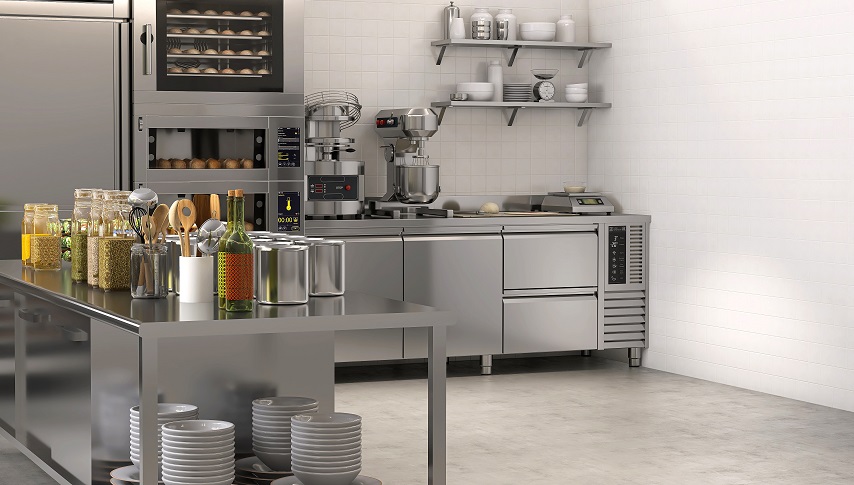
In the fast-paced environment of a restaurant, there’s limited time for lengthy cleaning processes. Flooring that’s easy to maintain ensures that cleaning is swift, allowing staff to focus on their primary responsibilities. Floors requiring special maintenance, such as polishing or sealing, create restaurant downtimes, which can disrupt operations and profits. Commercial kitchen flooring should be easy to maintain and resist staining from various oils, acids, and chemicals. A clean floor is a must-have in any commercial kitchen, and flooring that’s easy to care for must be a top priority.
What is the best flooring for a restaurant kitchen?
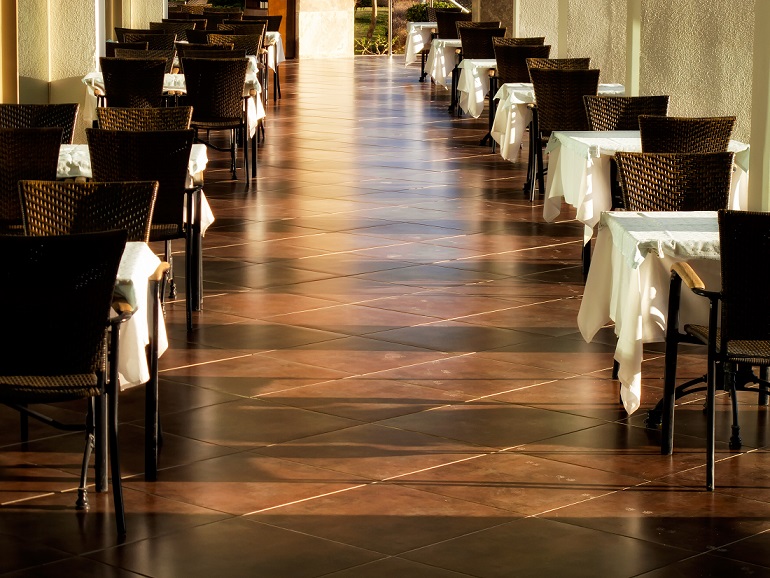
There are many options for restaurant kitchen flooring; we’ll review some of the most popular materials and their pros and cons. It’s important to note that material quality varies with manufacturers, so check the performance attributes before purchasing.
Vinyl Flooring
Vinyl flooring, also known as resilient flooring, is an engineered product made from natural and synthetic materials. The product comes in several formats, including tile, plank, and sheet goods. Vinyl sheet flooring can be installed with fewer seams, which means fewer places where crumbs, dust, debris, liquids, and organic material can hide. Many vinyl flooring products have built-in antimicrobial and chemical resistance. You can also add a cushioned underlayer to vinyl to provide comfort for workers who stand for long periods of time. Vinyl flooring is easy to install over many subfloors and requires minimal maintenance. Depending on the manufacturer, vinyl flooring can also be very slip resistant. However, it can be susceptible to damage from sharp objects or high temperatures.
Epoxy Flooring
Commercial-grade epoxy flooring is made of additives, resin, and pigment to create a liquid substance that can be poured directly onto concrete subfloors or existing flooring. One of the primary advantages of epoxy flooring is that it creates a seamless surface that doesn’t allow dirt, bacteria, or moisture to accumulate. It’s easy to clean, extremely hygienic, and can handle daily traffic, heavy equipment, chemicals, and temperature extremes. However, epoxy flooring may emit toxic fumes and odors depending on the manufacturer. It can also take several days to harden and cure, disrupting operations or construction.
Ceramic Tile Flooring
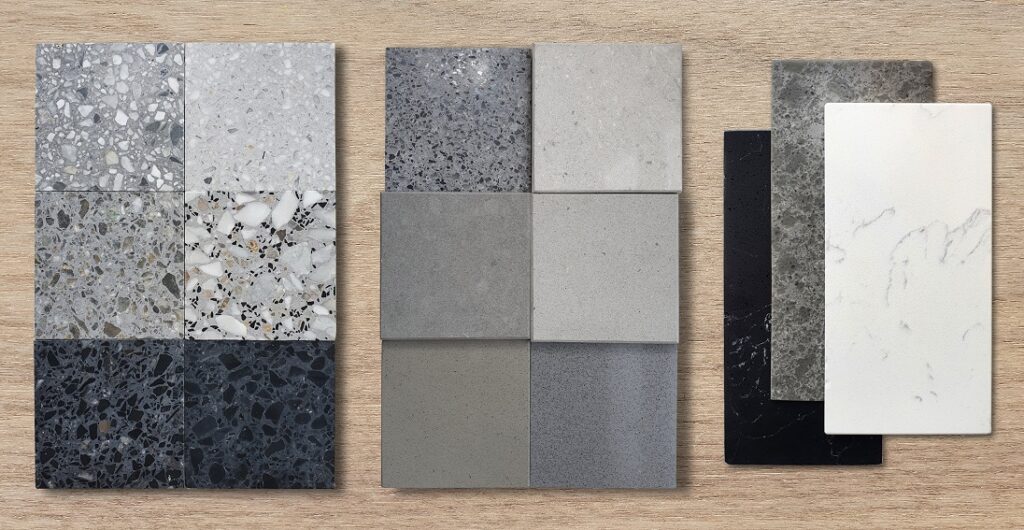
Ceramic tile is made from clay fired at high temperatures to create highly durable and impact-resistant flooring. When considering ceramic for restaurant floors, look for unglazed quarry tile that naturally has a rough anti-slip texture. Quarry tile comes in a limited number of colors and will create seams and grout lines that can be difficult to keep clean and free from contaminants. Ceramic is also an extremely hard substance with very little give, so it’s not ideal for all-day standing. Additionally, glazed tile is extremely slippery when wet and is not recommended for kitchen application.
Concrete Flooring
Concrete flooring is another poured option that takes time to dry, often up to several days, depending on humidity and climate conditions. Concrete floors are highly durable and have a high heat resistance. However, there are several drawbacks to this type of flooring. For starters, it’s very hard and uncomfortable for prolonged standing, and it can make an already noisy environment even louder. Concrete is also porous, which can allow bacteria and mold to grow. It requires sealing and additives for moisture and stain resistance and can be challenging to clean. In some jurisdictions, concrete flooring may not pass health inspections.
Natural Stone Tile
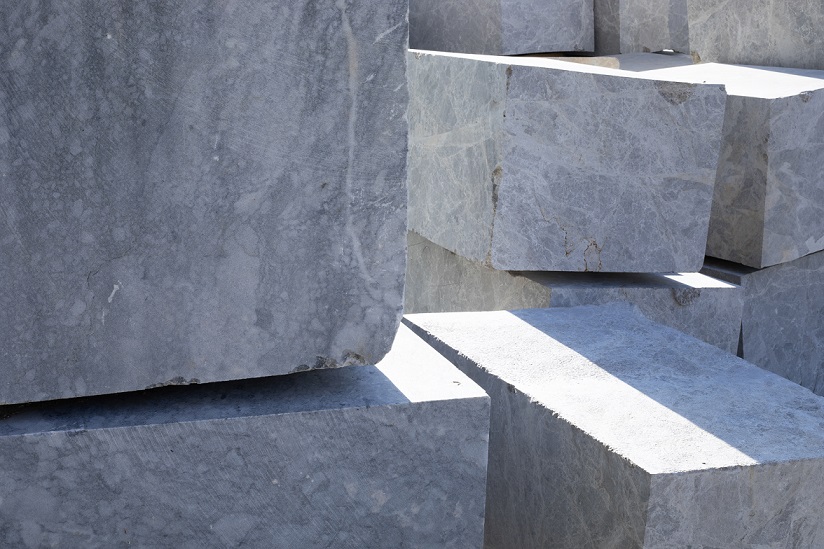
Natural stone can be a beautiful option for open-kitchen concepts. Natural stone is durable and attractive but also requires a lot of maintenance, including routine sealing to prevent stains, water damage, and bacterial growth. Natural stone tiles also have seams and grout lines, making cleaning difficult. It can be extremely slippery when wet, so look for natural stone tile with anti-slip properties. You’ll also want smooth tiles since natural stone can be uneven, creating safety issues for trips and falls.
Contact Us
If you need assistance with restaurant flooring, the experts at LX Hausys are happy to help. Check out our HFLOR vinyl sheet and tile products and complete our contact form and one of our representatives will be in contact with you promptly.
